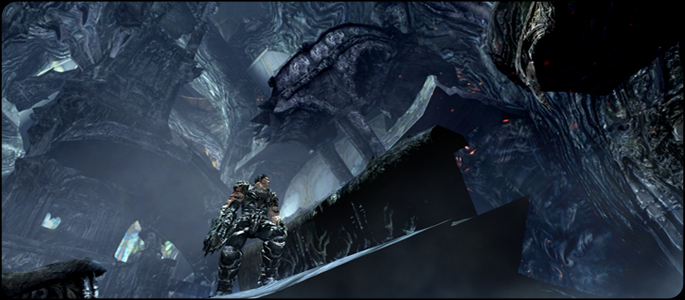
Quantum Theory is Tecmo Koei’s first attempt at the third-person shooter genre, and what a rollercoaster ride it has been for the publisher. The shooter, originally a PlayStation 3 exclusive, later on went multiplatform – greatly disappointing the PlayStation 3 faithful. Originally touted as a complete Gears of War clone, Quantum Theory undoubtedly strikes upon several similarities with Epic’s masterpiece – a notion which the developer’s themselves have admitted. Let’s find out if this truly is a Gears of War competitor or a title which can excel and wow gamers with its technical competence.
Approximately three years in development, Quantum Theory’s story and concept is quite intriguing. The name Quantum Theory, itself, comes from the definition of the phrase: basically, looking at something as it changes. The game showcases this theory in a perfect way. The game’s bulky, badass protagonist, Syd, embarks on a quest to destroy a “Living Tower”. Many years have passed since a world war inflicted cataclysmic damage on the human race and subsequently leaving only a few survivors in the aftermath. The human race has been threatened by a black material called “Erosion”, creating a post-apocalyptic environment. In steps Syd to conquer the Erosion and take down the evil and constantly-changing Tower.
During the precedence of the game, Syd meets the mysterious Filena while they both ascend their way to the top of the Living Tower in order to ultimately destroy it. While they don’t exactly get along at first, Syd and Filena soon have to work together and use various team-based attacks to defeat their enemies. The Erosion infested in the Tower intensifies as the two characters climb up through the ever evolving tower – which is where the quantum theory concept ties into the title. The Living Tower is called living for a reason: the layout of the physical tower continues to change as the player make their way to the top, making for a more challenging experience overall. For example, one hallway could look normal but, the next second, it could shift its motion, putting the dynamic duo in danger of falling to their deaths. One aspect in particular that distinguishes this shooter from the frequently compared Gears of War is the sidekick Filena acting as Syd’s usable sidekick. Filena is essentially a tool for Syd to fling towards hordes of enemies where she’ll trigger a deadly attack – something gamers will undoubtedly find themselves doing quite a bit throughout the duration of the single-player campaign. Strategically performed combos with feminine sidekick results in a more fierce attack against bigger enemies.

The gameplay is really what will grab the attention of players. A heavy emphasis was put on the cover-based mechanics, one of the main aspects the Gears of War comparisons revolve around. The cover system paired with the over-the-shoulder aiming mechanic will familiarize players almost instantly to previous titles such as Uncharted 2 and even inFamous; and it’s a good thing, too, since players will be doing a lot of of covering, aiming from cover, shooting from cover, going to another cover stance – you get the idea. Syd is always equipped with a dependable hand cannon. He’s also able to carry two other weapons ranging from shotguns, machine guns, and a third item from a typical list of weaponry. When shooting an opponent, the game momentarily shows the enemy upfront who explode in a spray of snot. When the enemies encountered get too close, Syd can execute them with a slow but powerful punch. Another effective weapon on his side, as mentioned above, is Filena. Tecmo Koei made an intelligent AI partner in Filena. She’s constantly present on the battlefield who will even take on enemies by her own. Also, if proper timing is practiced, Syd’s melee attack can be combined with one of her own which can take out multiple enemies at a time. Overall, the gun combat is solid enough to satisfy the player but it’s sadly ruined by other aspects.
Some of Quantum Theory’s gameplay elements are frustrating. For example, if you thought Killzone 2’s controls were the most stiffest in gaming, you’re in for a rude awakening. Nearly every single movement is somewhat of a chore to do with the main standout focused in the running. Syd can be running one way but will refuse to run in another sharp direction while running – a potentially annoying issue made apparent throughout the course of the game. The roll feature is quite useful to counteract the flawed steering since it can be used even when the main character’s direction is uncontrollable.
Definitely worth mentioning is the game’s interesting and engaging boss battles encountered throughout the Living Tower. Various bosses are mammoth-sized freaks of nature which players will just want to rip apart the minute they lay eyes on them. Some of the battles present a new challenge and dimension to Quantum Theory due to the fact that there will be no environment to take cover at, leaving Syd to try to strategically plan out the battle by dodging its attacks. While busy doing that players, will be able to find vulnerable spots on the bosses’ body to kill the gigantic beast. Filena also plays key to a few of the boss battles where players will have to ensure to user her. For instance, by tossing Filena at one of the bosses, he’ll grab her, thus opening a weak spot on the bosses’ hands which you could shoot at.

Visually, Quantum Theory is nothing exceptional. It definitely features its graphical showpieces, such as the enemy exploding into a pile of snot – not to forget in slow motion – but aspects such as the textures seems to take quite a while to load and aren’t particularly the best we’ve seen, especially when compared to the other third-person shooters on the market. The cutscenes are well done and, moments where it shows Syd and Filena teaming up to blow up an enemy, is visually impressive. The same can be said about the environment inside of the Tower, such as the moving platforms. The attention to detail on the characters isn’t too great, though, as it seems very unkempt. The bosses, on the other hand, feature a lot more detail down to the very last limb of the beast. The sound quality is not bad but, again, average at best. An execution of a weapon, such as the hand cannon, makes a clear, distinct sound while an enemy blowing up into snot sounds is just as unique.
Although we could not sample the multiplayer (for obvious reasons), Quantum Theory does seem promising in the online department. Sadly, Quantum Theory does not feature a co-op campaign experience – something which sounds like a match made in heaven for this title due to the fact there are two characters. The online modes include “Dead or Alive”, where players are divided into two teams and kill each other for points. Basically, whichever side has the most points at the end is the winner. Then, there is “Executioner”, a typical deathmatch mode lasting ten minutes where the rules of Dead or Alive apply. Lastly, which is by far the most compelling looking mode, is “Guardian”, a mode which has players divided into two teams with Filena as their leader. The remaining players in the match guard over the heroine from the enemy attackers.
Quantum Theory, at its core, is a cover-based third-person shooter which gives the player a fast-paced, fun, and sometimes addictive action adventure. Its countless similarities to Gears of War is closely showcased in both the gameplay and cover-based level design, which will put gamers in a far too similar experience. One of the most interesting parts of Quantum Theory and something it does well, however, is the Living Tower itself, since it gives the player a desperate urge to continue onward and discover what the Tower has in store. Navigating through a world where the evolving battleground surprises players with new and challenging obstacles by changing its form in real-time, which will hopefully entice potential players to pick up this western-styled Japanese title. The Tower delivers a moderately unique and fun experience which isn’t present in most of the available shooters on the market. The constantly-changing Living Tower ensures that players become accustomed fairly quickly to the new areas within the Tower – something which is refreshing to see. While Quantum Theory boasts its own unique attributes, it ultimately is not a title which shooter fans will be blown away by. It is a shame since, if the title delivered where it essentially failed, it could of been a totally fresh experience for gamers.
PlayStation LifeStyle’s Final Score
Living Tower concept is original and enticing Stiff controls is frustrating |
 |
–





